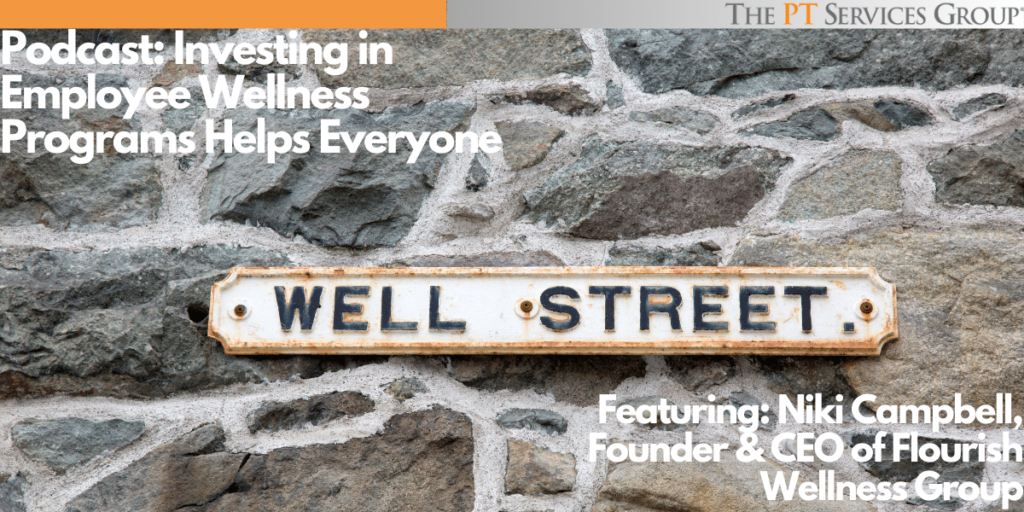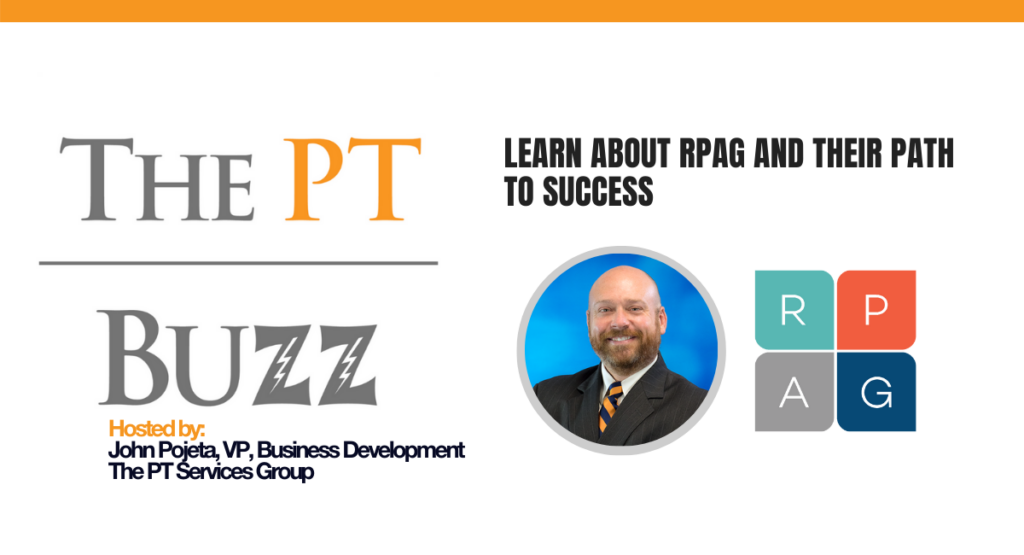In our latest episode, PT welcomes a return from our friend and sales guru, Dan Hudock. First appointments with new prospects are exciting and challenging. Apathy and the feeling of already having what you offer often position you behind the eight ball from the start. Join John Pojeta, from PT, and Dan as they discuss the approaches to help overcome apathy while driving a wedge between the prospect and their current advisor.
Where to Listen/Subscribe














Podcast Resources:
Any and all resources we mentioned in the podcast can be found here. Looking for something not here? Contact us, we’d love to help you out.
Guest Bios:
Dan Hudock is owner of Sandler Training, Wexford. Recognized as one of the top Sandler trainers and speakers in the world, Dan is able to provide hard hitting insights into the world of management and selling that few people can equal. Humor, life stories, and a passion for results enable participants to truly change their world. Dan works with many of The PT Services current clients to maximize their impact and growth.
Podcast Transcript:
John Pojeta: Hi everyone. John Pojeta here at the PT Services Group. I hope you don’t really well. And welcome back to another episode of the PT Buzz. And today I continue my conversation with Dan Hudock, who here PTs, affectionately known as our sales guru and it’s conversation around the two biggest roadblocks faced by salespeople. And it doesn’t matter if it’s a PT generated appointment, one of your own it’s all the same. And it’s conversation around prospect apathy and helping them overcome some of that internal. Feeling of they’re okay. Where they are. And then there’s the reality of the incumbent. And how do you start to drive a wedge between the prospect and their existing relationship that they have today? And again, by far the two biggest roadblocks salespeople face. So hope you enjoy the episode and thank you as always for joining me. How are you doing today? Dan
Dan Hudock: guru? It’s hard to answer. I’m doing great. You
John Pojeta: are our resident sales gurus, this new.
Dan Hudock: No, it’s just, that’s quite a title to have to live up to Dan Hudak, our okay. Sales guy, he’s average at best,
John Pojeta: you know, and we’ve all, we’re all around those people at times that love to provide low to no expectations. And that way they’re never disappointed kind of thing. So that’s what you’re recommending. We did
Tap/Click to View Full Transcript
Dan Hudock: anyway. Anyway. Right.
John Pojeta: So for everybody’s benefit before I asked Dan, my first question where this comes from is we were just having a conversation behind the scenes to talk a little bit about how to frame what we’re about to talk about and put it in a, in a space, in a way of something that’s relatable for everybody and not.
In our industry space of financial services, insurance, MSP, all that good stuff. So with that backdrop, Dan, have you been to a doctor recently?
Dan Hudock: Yes. So, you know, obviously the topic for today is apathy and the incumbent and all that kind of stuff. And, and I was telling John a story that he suggested I share.
So if you don’t like it, it’s all John’s fault. It is, but let’s, let’s pretend that you woke up this morning and your ankle was in really bad shape and you thought, you know, I had to call my chiropractor and get in there and have them work some adjustments on my ankle so I can be back to normal. And, and so you go and you see the chiropractor and they hear about your ankle for about 30 seconds to. And then they proceed to tell you about your hip and they, they give you all these brochures on things they can do for the hip. And they direct you to certain websites and they overload you with all this information on the hip. And then they say, you know, why don’t you go and do some research on that?
And then you can call tomorrow or the next day to schedule an appointment for after Thanksgiving or whatever, and we’ll work on your hip and you walk away from that thinking. I don’t have a hip problem. I have an ankle problem. How likely are you to want to follow up with that chiropractor? It’s slim to none.
And yet that’s what a lot of people do on sales calls. They go in and they hear one problem. And before, you know, it. We’re talking about our seven point solution and how we work with clients and all the great things that we do. And here’s our website and here’s our brochures. And we wonder why people don’t make a switch and, and join up with us.
John Pojeta: We call it the offer. Kind of thing where you start a conversation, you ask a question, they give you a little nibble, you take the off ramp and you kind of run with it. And next thing you know, you’re, you’re, you’re somewhere you never really intended to be. And you’re trying to convince them let’s, let’s continue the conversation.
And at the end of the day, what you describe the problem may really be with that person’s head. But as you’re saying that you, you haven’t provided the impetus for them to connect the dots and understand, okay, let’s move forward. And how quickly you get to some of those things also matters because you can face them speed, blow back, depending on how you go.
Dan Hudock: Yes. Well, so if it is really the hip, how do you get. The person to understand and see that. And so let, let’s take a look at our prospects. How do we get our prospects to even understand that they need us, whether that’s our service, our products, whatever, as opposed to the incumbent, or as opposed to they’re not doing anything, how do we get them to even know that they need us?
And so you have two options. Option one is you tell them. Well, you need me. Here’s why option two, you ask questions so that they can find out for themselves that they need you. And that’s the magic. If you can figure out what questions to ask so that they. Start to form their own opinion that they need to look at this further, that they need to research this and go into this and have further discussions with you.
If they use their own data, they’re more likely to buy.
John Pojeta: Yeah, no doubt. And that’s where you get into is obviously it’s. It’s easy in a relative sense. If somebody is searching for something, they know that they need, it’s a whole different ball game of, I can either try and tell them what they need and, and have them follow in essence, which is not likely to happen versus taking them through a process of sort of developing their own self-awareness of, okay.
Now I understand where you can help me and how you can help me and let’s continue. And all that good stuff. So you open the door to the incumbency side. So why don’t we start on the incumbency side? And we talked about two areas. We want to talk about one. How do you drive a wedge between the prospect and the, and the current incumbent in essence to create opportunity, but then also carrying that into how do you protect your existing client base?
And continue to drive a wedge between others and your clients. So let’s, let’s start in that space of meeting with prospects, trying to overcome the incumbency factor, because the vast majority of people we work with, those are the opportunities they want because the prospect obviously has something in place.
They recognize the value of that something. And so. How do you shift? How do you get them to move from where they are to you, your services, et cetera. So take me down a path there initially of driving that wedge or however you like to position that, that, I guess my more, my terminology.
Dan Hudock: Setting the stage.
Let’s pretend that you, that you’re someone who already has a 401k plan in place as an example. All right. And already are using a company. Chances are pretty good. You didn’t wake up this morning and say to yourself, man, I need to find a new company to do this. I need to, I need to find another, another person to be working with.
And so what that means is for the most part you’re content, you’re happy with what you have. Now. There might be better stuff out there. There might be stuff that’s less expensive, whatever, whatever, whatever, but for the most part, you’re happy and incomes. This happy-go-lucky salesperson. Who’s now got an appointment with you and, and they start to share all the great things that they’re doing.
And you’re saying to yourself, I have that already. I’m already. Okay. I don’t need anything else. So what do we do here? Well, here’s the way I look at things and that scenario, I just laid out. You, the buyer woke up feeling pretty healthy this morning. Your, your company’s good. Your plans are good. Your, your, your companies you’re using are good.
And it’s through questions that the salesperson can get the buyer to go from feeling completely healthy and well to start to feel a little bit sick. And then through further questions, start to feel. Hey, I’m hurting here. And then through further questions, start to become almost critical and how they perceive things.
And then they’re looking for the savior they’re looking for. Can you help me please? Right. And that all comes by questions. One of the things that I constantly am putting in people’s heads, when I’m coaching your clients, John is on these first meetings, quit showing up and telling everything you do. And start showing up and asking questions to get the prospect, to understand that what they have in place is okay, but there’s so much more out there that they could be doing and having and looking at.
John Pojeta: Yeah. And the, and there’s that natural tendency to say the way I get them there, as I tell them, Where those gaps are. I explain the opportunity, those kinds of things. And I know we’ve talked about this a lot over the years, but talk a little bit about why there’s such a tendency to go there and do that versus asking questions.
Dan Hudock: Okay. Well, one of the main reasons is people that are in sales are there because they want to get their needs. And, and so if I show up on a sales call, one of the ways I get my needs met is I try to bowl you over with my greatness bowl, you over with my products and services and how we do things that are fantastic in the hopes that you look at it and go, oh my goodness, why have I not been buying from you from day one?
And I think that is common nature, which is, let me tell you about myself. Let me tell you about my company. Let me tell you about my products and services, because at the end of the day, John people like talking about themselves and yet in sales, it’s never about us. It’s always about them and there’s, there’s the change.
And so a great sales person, isn’t a talker. A great salesperson is actually a listener. In order to be a great listener. You have to be a great question person as well. So know what questions you want to ask before you even show up? That’s the easiest way to go.
John Pojeta: So instead of just trying to bestow your goofiness on somebody, but I think what’s fascinating.
And for Ray Lewis, it’s obviously not the first time you’ve heard any of this. It’s not new. It’s not revolutionary, but the. Still a massive gap in the large percentage of salespeople who do that versus our great questioners. But the fascinating thing, if you think about it is we, you just laid out the cause of why that plays out relative to, we like to talk about ourselves.
We like to talk about what we know and what we’ve learned in our experience and all that good stuff. And that’s the, that’s the lead into the questioning, because if you like to talk about yourself, the likelihood is the person or people across from the table from you like to talk about themselves, to give them the chance, ask
Dan Hudock: the questions. Yeah, a great example is, and I’m going to use non-business for this. So I want you to pretend that you’re at a gathering of, of adults. It could be a networking event. It could be a party, it could be a reception at a wedding, whatever. And you’re talking to a stranger, someone you’ve never met before. And the whole time you only talk about yourself, your interests and what you do.
What’s that person going to think. As opposed to, if you had spent the majority of that time, asking them questions about what their interests are, where you know, where do they live, what about their family? What happens is that other person goes, holy cow, that John magenta guy he’s all right. You know, and then, and then they go, but I don’t know anything about them, but there’s something about them that I really like.
John Pojeta: And that’s a huge piece because we’ve all been around those people that we walk away with that sentiment. And we know we just want to be around them more. We’re not sure why yet, but you’ve created that sort of that, or, or around yourself where they want more engagement. They want to talk more, they want to move forward.
Dan Hudock: Yes. Yeah. And, and, and it’s, it’s hard because. When we start to ask questions, here’s what happens, John? I’m in sales. I ask you a question, you answer it, but while you’re answering it, I’m not even really listening to you. What I’m doing is I’m thinking of the next question I want to ask. So then I hear that you’re finished and I asked you another question and, and, and that’s not the way this goes, and this is.
This is a skill. This is something you have to learn to do if you want to be really good in sales. And that is when you ask a question, stop thinking and just listen. And then based off of their response, you can figure out what’s the next question to ask. But at the end of the day, when I’m trying to do.
Is get them to admit that they have a problem with the, with the incumbent and they can’t get it solved and it’s big enough problem that they might be willing to switch if they hear something. That’s the greatest thing since sliced bread as an example. Yep. That’s all I’m looking for. Is, is there a wedge there as you, as you put it and is it big enough and wide enough and important enough for them to actually want to do something about it?
Maybe not. And then we’re done
John Pojeta: kind of on a side note, I’ll bring us back to the topic in a minute. Where do you know where that phrase came from? Great, greatest thing since sliced.
Dan Hudock: No idea. I don’t either. I was wondering what they
John Pojeta: need to do before you slice.
Dan Hudock: Just going to say that. Yeah, exactly.
John Pojeta: No. And what you’re describing is the old days where I first learned it was Stephen Covey talked about. Most people listen with the intent to respond rather than the intent to learn and understand. And that’s what you’re saying is, is engaged the listening skills. And I think sometimes people are so focused on asking a series of questions to get a desired response, almost like an attorney and somebody on a witness stand of I’m going to get.
To say what I want them to say and therefore go where I want them to go, rather than just let the conversation take a natural course and stay curious, learn about the person, learn about the situation and, and off you go.
Dan Hudock: Yeah. I got to tell you, John, I’ve been coaching clients of PT for probably 15 years, right?
I mean, it’s been a long time and it is the majority that show up on these first meetings. And just spill out all kinds of information and they’re not getting any information. They’re not asking a lot of questions and then they wonder why they can’t get the second meeting or they wonder why it’s taken so long to try to close this account and then, and then don’t get it.
And sometimes they do get it. Don’t get me wrong. But it’s, so it’s the clients of yours that show up with a pen and paper and really are there to do nothing by. Ask questions now it’s not an interrogation. I do need to share some information here or there, but it is really meant to ask questions. And here’s the beauty of it all.
If you do that, number one, you find out great information, but number two, because you found out great information. They can’t wait to meet with you again. Yep. Which increases the likelihood of getting to second meeting as an example.
John Pojeta: So, so with pen, paper and spotlight,
Dan Hudock: no spotlight,
John Pojeta: what’s interesting though, is one of the things, and this took me a long time to figure out for myself is my listening with the intent to respond ties back to where you started the conversation.
If somebody gives you a little nugget of information and you don’t want to forget. And so mentally you’re, you’re holding that, but they’re still talking and you’re not necessarily absorbing what they’re sharing anymore. And so for me personally, it was always one of those things of, if you give me a little nugget like that, I just write it down and then I’ve forgotten about it because I’ll circle back to it when it’s appropriate to circle back to it.
But it keeps me engaged with the
Dan Hudock: person. So I totally agree. And by the way, I was talking to one of your clients on Tuesday, who said that every time they go into a meeting, When the prospect starts to talk about stuff, they say, Hey, do you mind if I take notes on this? And so, number one, that’s a crutch for them because they need to take notes.
So they remember, but number two, they’re getting permission from the prospect and there’s some psychological stuff going on there. It’s a good thing. And, and you are spot on John. It takes it out of your mind, puts it on a piece of paper. So you can now listen even more intently. It’s all about the listening.
John Pojeta: It all comes back. Well, there’s some ways that. Learned to better understand who you are and you put the things in place that help you. It’s that simple. So let’s, let’s stay on the incumbency factor in one area in terms of protecting existing clients. And it’s probably the wrong way to term it in terms of protecting.
That’s not the, yes. That’s you want to, you want retention, but what are some of the things that you should be doing with existing clients? That help that retention side, because everybody we talked to, obviously we great service turn phone calls. We’re always there diligent about this, that and this. But what are some other ways that they can separate themselves there from a standpoint of retention of existing clients?
Dan Hudock: Well, part of it is what you just mentioned. I mean, the number one reason why clients leave is they don’t feel valued. They don’t feel important. And, and so the question is, what are you doing about that? I get that returning the calls, the servicing, and all that stuff, but let me throw something else out at you.
Harvey McKay, who’s the author of a book, swim with the sharks as bunch of other books as well. But one of the things that he came up with is what’s called the Mackay 66. These are 66 things you should know about all of your clients. I personally think that’s a bit overkill, but, but let, let, let’s just say it’s the top five things.
What are five things you should know about your clients? Well, obviously you should know when their birthdate is, if they’re married, when their anniversary date is who their spouses name is, what are their kids’ names? What kind of pets do they have? What are their pets names? What kind of hobbies do they have?
Where did they go to college? Where did they go to high school, blah, blah, blah. So you’ve come up with these things that you start to know about your clients. And then you put it in your calendar that maybe once a month you’re going. So let’s pretend John you know, I know you’re married and I know your anniversary date, right?
Maybe I do a quick Google search people that were married on the same date as you. And it comes up with a webpage and I send you an email that says, Hey, John, I just saw this on the internet thought of you thought you might. It’s just that there’s no sales there. There’s no. Hey, can you give me more? It’s that?
It’s that touch? And so that’s one major thing you can do. The second thing, which needs to be face-to-face is you’re having a great meeting or something. And towards the end of it, you just say, Hey, John, by the way, has, has there been any of my competitors trying to knock down your door to get your business?
And if not then, great. But if he says, yes, sir has. And then I say, what do you tell them? And that’s a really good defining moment because it gets again your customer to tell you why they really wouldn’t look at somebody else, why they would look at you. And then the third thing you could do is ask the question, what would have to happen for me to lose her business.
Yeah. And that’s a hard question to
John Pojeta: ask. It’s tough, but it’s courage,
Dan Hudock: but you got to know what, what would have to happen for you to lose the business? Anyway, there’s three things.
John Pojeta: Yeah. W what’s fact that there’s this gentlemen out there and I can’t remember his name. He wrote a book called Giftology and he talked about the whole arts and science around giving gifts and different things like that.
And some of the things that he mentioned was he. One of the strategies he utilized was he would always find out about his clients, most significant person in their life. So spouse, child, parent, whoever that person is. And whenever that person. Birth date or something special happened in that person’s life.
That’s when he would send something out. So he would try and touch that special person who would then say, who’s this guy, or who’s this person sort of thing, and connect dots in different ways. So there’s some really fascinating things out there. And I think those are great.
Dan Hudock: John. I got to share this. I, I have a customer.
That’s a president of a pretty large company, high D type personality. And he’s got this little dog it’s pure way. I don’t know what kind it is, but he calls it fluffy. His name is fluffy. I, I, this is not a joke, right. He just totally sick. So when I talked to him, which isn’t, I mean, it’s probably once a month.
I say, Hey, before we get into business house, fluffy do it. Yup. And here’s this strong D type personality who just for a couple minutes, talks about his dog. Right. And then we sit down and though he doesn’t break down, but you know, but it it’s a connection. And I wonder how many talk to him, ask him about his dog.
John Pojeta: I’m sure. Not enough. No, seriously. I think that’s something that’s very special to him. You recognize that and you always make sure you touch on it. It’s good stuff. It really is. Well, and you mentioned the comment of feeling valued and I think oftentimes we’re not good at thanking people for their business and thanking them for what they do in the relationship, the partnership, those kinds of things.
And just those direct approaches like you described. Who else is knocking on your door? What would it take for me to lose your business? Those kinds of things. And yeah, it takes a lot of courage though, to, to ask those questions. So let’s shift gears. Let’s talk about the apathy side. So many areas we can go into here.
We touched on a little bit where you mentioned the idea of sending out some stuff or emailing and they didn’t respond and sort of that ghosting side of things, but talk a little bit about apathy and sales.
Dan Hudock: Apathy is your biggest competitor. No matter whether you’re dealing with incumbents or they’re buying something like what you sell for the first time, it is the biggest competitor because they don’t have to do anything for the most part.
And so how do you overcome apathy while in the world of sales? It is finding pain. It’s finding that emotional reason why somebody would have. Change or do in the first place. And here’s the thing. John pain goes away over time. And, and so, you know, if you were a prospect of mine and I was talking to you today and we had scheduled our second meeting, Two weeks from now, you better believe at the beginning, part of that second meeting, I’m revisiting some of the pain we uncovered today.
And I always view it. Like it, it’s almost like they have this gash on their arm. All right. I like medical stuff for stuff like, but it’s almost like the first meeting I put a gash in there. Right. That’s pain. But, but after the first meeting, they covered it with a band-aid. In fact, it’s almost healing by the time I meet with them the second time.
And what I need to do is rip go across the desk and rip that bandage off and get it to bleed. And yet, right. That is the key. And we all know this. We’ve all experienced this. Let me give you a really bad example, but drives the point home. You wake up today and your, your, your tooth is hurting and you’re like, oh man, I got to get to the dentist and you call the dentist and the dentist takes you in.
And I go, yeah, you got a pretty bad cavity. I’m going to need to fill it up. Let’s get you scheduled in for next week. So you go great tomorrow. You with. And there’s no tooth pain. In fact, you don’t even have pain for the rest of the whole next week. What’s the likelihood you’re going to keep that appointment.
It’s slim for some of us. You’ll still keep it. But for most of us I don’t feel any pain. Now I can keep putting this off. That’s what happens in the world of sales. So if you want to overcome apathy, it’s all about, you have to find what the pain is and you got to keep that in front of them all the time until they buy from.
John Pojeta: Yeah. I think one of the really interesting things to talk about there. And I think a lot of times it helps if you flip the roles and think about how you act as a buyer or a prospect, because then you start to understand a little bit differently. But I think about what you described there, where I have a first conversation with people who are trying to get PT to do this Saturday, the other thing, and I get onto the second conversation and everything from the word go is about how they’re going to solve my problem.
But they don’t really discuss the problem or the pain point. And instead of recapturing that out of the gate to get me reoriented, they just go on, here’s all the wonderful things we do.
Dan Hudock: Yep. Yeah. That’s a great example right there. So the way it overcome apathy, it’s always pain. People will not do anything unless there is a reason and that reason is pain.
John Pojeta: Yeah. So, so the reason they’re not returning your phone call or responding to your email after that initial meeting, or even sometimes the second meeting has nothing to do with the fact that they suddenly lost it and don’t get it. It has to do with the fact that you didn’t do a good job in developing pain previous.
Dan Hudock: Correct.
John Pojeta:Yeah. Well, and I think the other thing comes in, we all have this. We all have personal lives who have a lot on our plate and to the point of incumbency, if I’ve got that 401k now, and I think it’s okay, no, one’s breaking down my door inside the firms saying it’s a problem either. What’s motivating me to go in that direction versus getting back to all the other things that I have
Dan Hudock: to do.
Right. If you got, if you went in your car today and you noticed it’s slipping gears and you go, oh, my transmission’s going, but you’re still able to drive. Most people would just continue to drive. And then a week from now, it’s getting worse and worse and worse. And maybe you go and get it taken care of before it strands you.
But a lot of people won’t, they’ll wait until it strands them and then they have to get it taken care of. And so that’s pain, right? Initial pain is that the gears are slipping. Well, I can either do something about it or keep waiting. And if the sales person’s good. They’ll keep asking questions to get me to read.
This isn’t getting better. It’s only going to get worse and it may strand me or a member of my family. And it’s probably not when I’m just going out for milk. It’s probably when I’m on the way to some event that I want to go to or something else has happened. And it doesn’t strand me at the end of my driveway.
It strands me on the interstate at 1130 at night. Not saying I’ve been there, but there’s an example and a.
John Pojeta: Yeah, I was laughing when you started the store out, I’m a big fan of the TV show, big bang theory. And there’s that episode where Penny’s driving Sheldon along and Sheldon’s looking over and her, her check engine light is on and Shannon’s like, I think that.
Is illustrating a problem or however he technically defined it and she goes, it’s been on for two years, Sheldon, it’s fine over. And he wants to keep going back to that. And, you know, there’s just that those things we tend to ignore until they become critical versus addressing the warning signs that come up along the way.
And you know, it’s, there’s a human factor in all of this that when you recognize and you address it, it starts to change how you do things, which is
Dan Hudock: a big thing. Right. And it’s the salesperson’s job to help the prospect either get to the point where it is critical or also get them to realize it’s not critical and it never will be.
And that’s okay too. Yeah. Yeah.
John Pojeta: But it’s okay to disengage and move the. Yes. Yeah, you’ve got it. All right, Dan. Before we let the crowd go, are there any other final points you want to make or any other doctor analogies? You have
Dan Hudock: no more doctrine. Look, if you haven’t gotten anything out of this session, number one, shame on us.
Obviously we didn’t do a good job. Just become a better listener, not only in business, but in life, it will make a difference.
John Pojeta: Yeah. And, and, and it’s one of those things. This subject matter, we’ve talked for years and we will talk about our for years to come, because it won’t be solved by this 20 minute podcasts.
But the other piece to it is talk about this stuff. If you don’t have a coach like Dan, if you don’t have somebody to constantly work. The sales side, don’t just work on the, get, getting better at insurance or the financial side or the, the minutia and the things that you, you apply in products and services.
Get great about how you do it. And I think I can’t stress that enough. So as always in, thank you greatly
Dan Hudock: for the. Great cat. And with you, John, take care. You too. We’ll
John Pojeta: do it again soon. All right. All right, everybody. Thanks so much for taking the time. As always, please visit us theptservicesgroup.com/buzz.
You can listen to this episode again, there you can leave us some comments. Love it. If you give us some feedback on some other subject matters that you’re struggling with, or you’d like us to talk about, and we’ll look forward to seeing you again next month. Thanks.







